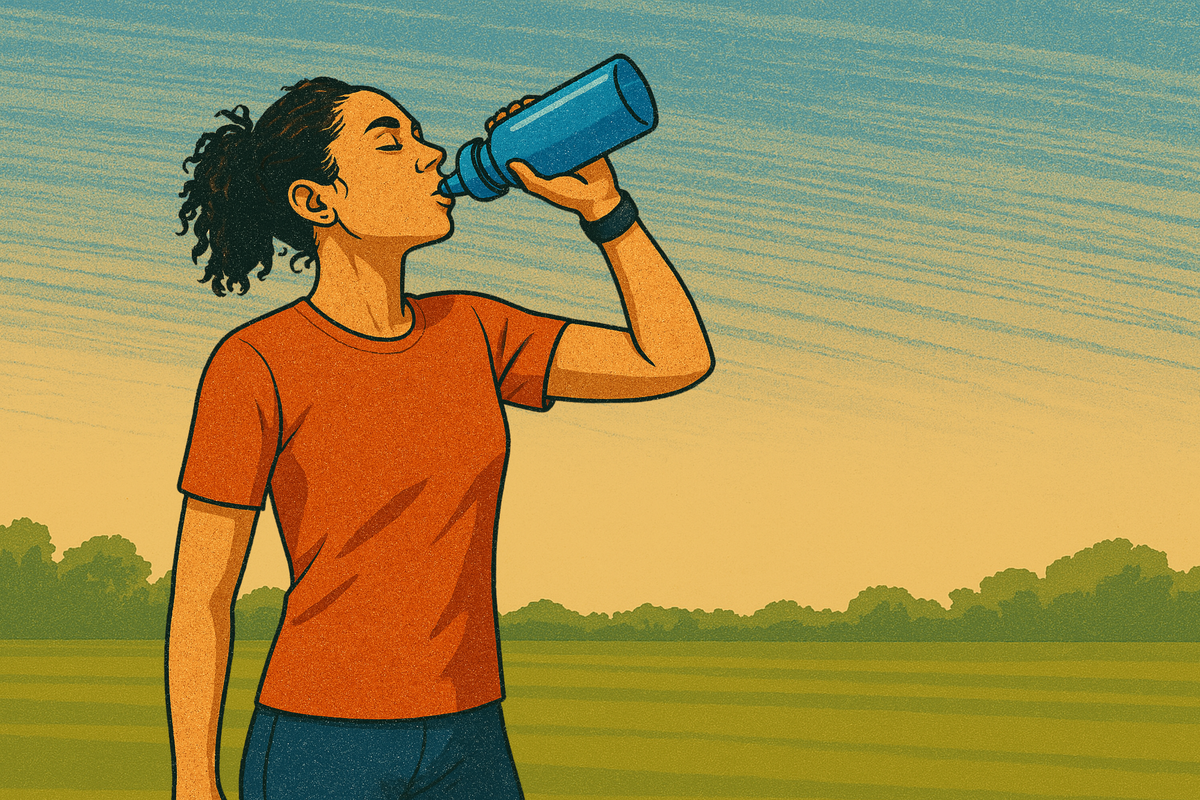
Staying hydrated is crucial, especially when you’re pushing your limits in the heat. But do those fancy hydration drinks—like Gatorade, Pedialyte, or Liquid I.V.—really give you an edge? A recent study in the Journal of Exercise and Nutrition put a proprietary water formulation (PW) to the test against a standard carbohydrate-electrolyte drink (CE) and plain distilled water (DW) to see if it made a difference during exercise in hot conditions.
The Study Scoop
Researchers had 37 active adults (25±7 years old; 19 females) hydrate with either PW, CE, or DW for five days. Then, participants tackled two 45-minute treadmill sessions designed to mimic soccer play in toasty conditions (82-91°F with 40-50% humidity). They replenished fluids lost at halftime and underwent cognitive tests and surveys to gauge their responses.
What They Found
Despite the different drinks, there weren’t major differences in hydration status or performance among the groups. Interestingly, those drinking PW actually felt like they were working harder—reporting a higher rate of perceived exertion (RPE) compared to the DW group. So, while specialty drinks may not physically boost performance, they might mess with your mind, making you think you’re pushing yourself more.
Another key takeaway? Hydration is personal. Factors like sweat rate, exercise intensity, and acclimation to heat all impact how well you stay hydrated. Marketing for sports drinks often boasts about “enhanced absorption” or “optimal electrolyte balance,” but the science behind these claims is still mixed. Unless you’re an ultra-endurance athlete sweating buckets for hours, plain water and a well-balanced diet can usually do the job just fine.
The Science of Hydration
The body’s ability to regulate hydration is a finely tuned process. Electrolytes like sodium, potassium, and magnesium help maintain fluid balance, nerve function, and muscle contractions. Traditional sports drinks—like Gatorade or Powerade—are designed to replace these lost electrolytes, but in most cases, your body can get enough from food.
On the flip side, drinking too much water can lead to hyponatremia (a dangerously low sodium level), which can be just as risky as dehydration. The bottom line? Balance is key, and guzzling pricey hydration drinks isn’t a magic bullet for performance.
So, Are These Drinks Worth It?
In this study, no hydration solution outperformed the others in keeping participants hydrated or enhancing performance in the heat. That doesn’t mean your favorite sports drink is useless—it might taste better, provide a mental boost, or help replenish electrolytes after a long, sweaty workout. But if you’re just going for a casual jog or hitting the gym, water will probably do just fine.
Bottom line: Listen to your body, hydrate consistently, and don’t fall for the hype. Whether you’re reaching for a bottle of Gatorade or a simple glass of water, staying hydrated is what really matters!
Quick Bites (For Social Media)
1️⃣ Hydration Wars: Specialty Drinks vs. Water!
A new study found no significant performance differences between a proprietary water, a carb-electrolyte drink, and plain water during exercise in the heat. Stay hydrated, no matter your choice! 💧🏃♀️ #HydrationMatters #FitnessScience
2️⃣ Feeling the Burn?
Participants drinking a specialty water reported higher exertion levels post-exercise compared to those drinking distilled water. Sometimes, simple is better! 🔥💦 #ExerciseScience #StayHydrated
3️⃣ Performance Boost or Bust?
Research shows that fancy hydration drinks may not give you an edge over plain water during workouts in hot conditions. Drink what works for you! 🚰🏋️♂️ #HydrationTips #FitnessResearch
4️⃣ Hot Workout? Hydrate Right!
A recent study suggests that the type of hydration—specialty drink or plain water—doesn’t significantly impact exercise performance in the heat. Listen to your body and stay cool! ❄️🥤 #WorkoutTips #Hydration
5️⃣ Specialty Hydration Drinks: Worth It?
New research indicates no significant benefits of proprietary water formulations over plain water during exercise in warm conditions. Choose what keeps you feeling your best! 🌡️💧 #FitnessFacts #HydrationHacks
This article is based on research by Blaine Lints and colleagues, published in Journal of Exercise and Nutrition, Volume 8, Issue 1 (2025).
Discover More
- Does Swearing Make You Stronger? the Surprising Science Behind Cursing and Performance
- Power Up Your Performance With Probiotics: How Gut Health Could Be Your Secret Weapon
- Move Your Mood: How Exercise Lifts Depression and Anxiety During Menopause
- The Weekend Warrior vs. Regular Exercise: What's Best for Slowing Down Your Biological Clock?
- Can Creatine Save Your Workout When Cutting Carbs?
- Carnivore Diet for Athletes: Do You Need Carbs After All?
- Mix It Up! How to Combine Cardio and Strength Training for Maximum Results
- Rocking Your Walk: How Unstable Shoes Could Strengthen Your Feet and Improve Your Balance
- Trail Running Safety: Navigate the Path to Injury-Free Adventures
- Tech Your Way to Better Fitness: How Older Adults Are Using Digital Tools to Stay Active
- Rest Periods Matter: Finding Your Sweet Spot for High-Intensity Sprint Training
- Supercharge Your Jump: How Adding Bands to Your Deadlift Can Boost Performance
- Caffeine Before Exercise: Is Your Pre-Workout Cup of Joe Actually Helping You Burn Fat?
- Paws-Itively Perfect Exercise: How Your Dog Can Be Your Best Workout Partner
- The Long and Short of It: How Pole Length Can Boost Your Cross-Country Skiing Performance
- Time-Restricted Eating: Get Leaner Without Losing Your Gains
- Boost Your Strength & Shed Fat: Essential Amino Acids + Resistance Training
- Finding Your Perfect Fit: How Footwear Affects Performance and Injury Risk
- HIIT vs. Moderate Exercise: The Mood Rollercoaster Your Workout Takes You On
- Hydration Hype: Do Specialty Drinks Boost Exercise Performance? See more
